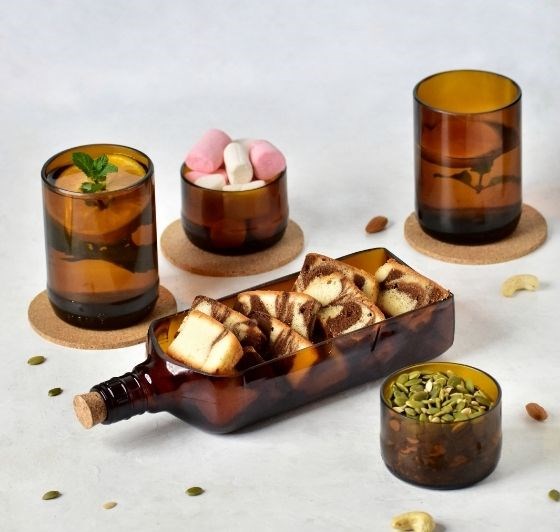A local student-run start-up is helping Vancouver take a big step toward sustainability.
Mosa, founded and operated by UBC students, combs through beach cleanups and works with local restaurants and bars to collect discarded glass bottles and upcycle them into drinking glasses and home accessories.
Founded by Abhiudai Mishra and Prishita Agarwal who got the idea at a house party, the glassware start-up helps upcycle around 300 glass bottles per week.
Now, thanks to a new partnership with the City of Vancouver, Mosa will be able to speed that process up to 300 glass bottles per day – all done in a 300 sq ft micro-factory.
The new two-year pilot project kicked off on June 14.
"The main idea with this project is to pilot new technology," shares co-founder Prishita Agarwal with V.I.A.
"Vancouver wants to become a zero waste city, so this is a step forward towards that direction."
How will this pilot help Vancouver achieve its sustainability goals?
While Vancouver has a Recycling and Waste Centre in South Vancouver and a landfill nearby in Delta, not all glass is accepted for recycling.
Glass construction materials, for instance, are listed as banned recyclable materials and are not accepted in residential recycling bins. Otherwise, residential glass packaging collected by Recycle BC, such as jars, bottles, and containers, is shipped to a facility in Abbotsford where it is processed into new bottles and to one in Quesnel where it is made into sandblast materials, according to Recycle BC.
Instead, the new partnership will redirect recycled glass to Mosa rather than the City's recycling facilities, supplying the start-up with more materials, which will be sold on Mosa's website.
With Mosa's help, glassware will not only now be locally recycled but will be done so in a small facility, resulting in less emissions produced and thus, less environmental impact.
"Because [micro-factories are] so small, you can put them anywhere," says Agarwal, who recently presented a TedX Talk on the topic.
There are typically between five to seven employees working at each micro-factory, with no transportation required at all, even to sell the final products, the co-founder explains.
"We're taking the waste from Vancouver, upcycling in Vancouver, and then selling it again in Vancouver. So that closed-loop system is what we're trying to implement," she says.
'Shocked but also happy'
Despite submitting an application, the partnership still came as a surprise. Agarwal says the Mosa team thought the city would choose a larger company to work with.
When the team of students got a call-back from the City, they were "shocked but also happy" at the news.
"We are very privileged to have this opportunity to be able to make such a big difference for Vancouver's economy and sustainability," says Agarwal.






